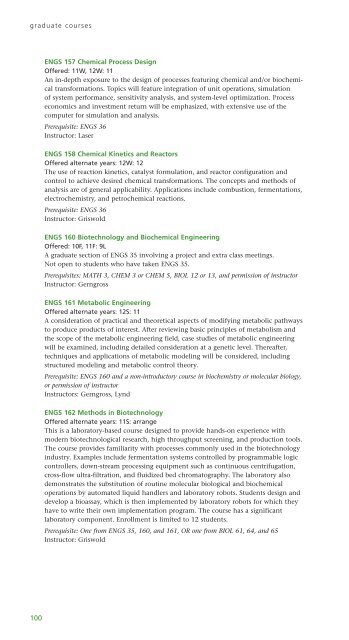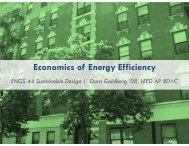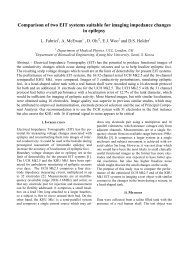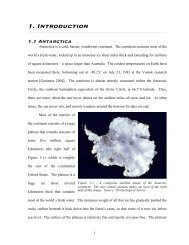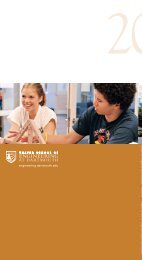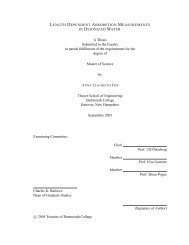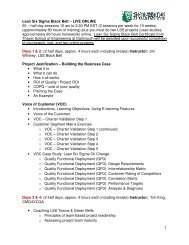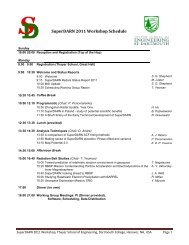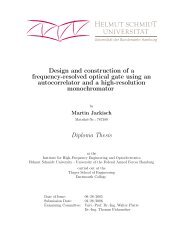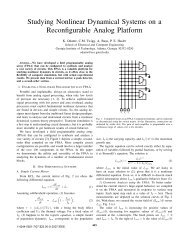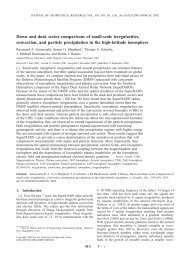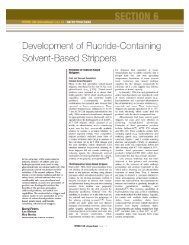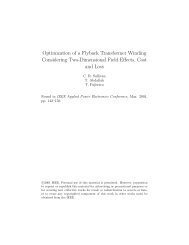Courses Programs - Thayer School of Engineering - Dartmouth ...
Courses Programs - Thayer School of Engineering - Dartmouth ...
Courses Programs - Thayer School of Engineering - Dartmouth ...
Create successful ePaper yourself
Turn your PDF publications into a flip-book with our unique Google optimized e-Paper software.
graduate courses<br />
100<br />
ENGS 157 Chemical Process Design<br />
Offered: 11W, 12W: 11<br />
An in-depth exposure to the design <strong>of</strong> processes featuring chemical and/or biochemical<br />
transformations. Topics will feature integration <strong>of</strong> unit operations, simulation<br />
<strong>of</strong> system performance, sensitivity analysis, and system-level optimization. Process<br />
economics and investment return will be emphasized, with extensive use <strong>of</strong> the<br />
computer for simulation and analysis.<br />
Prerequisite: ENGS 36<br />
Instructor: Laser<br />
ENGS 158 Chemical Kinetics and Reactors<br />
Offered alternate years: 12W: 12<br />
The use <strong>of</strong> reaction kinetics, catalyst formulation, and reactor configuration and<br />
control to achieve desired chemical transformations. The concepts and methods <strong>of</strong><br />
analysis are <strong>of</strong> general applicability. Applications include combustion, fermentations,<br />
electrochemistry, and petrochemical reactions.<br />
Prerequisite: ENGS 36<br />
Instructor: Griswold<br />
ENGS 160 Biotechnology and Biochemical <strong>Engineering</strong><br />
Offered: 10F, 11F: 9L<br />
A graduate section <strong>of</strong> ENGS 35 involving a project and extra class meetings.<br />
Not open to students who have taken ENGS 35.<br />
Prerequisites: MATH 3, CHEM 3 or CHEM 5, BIOL 12 or 13, and permission <strong>of</strong> instructor<br />
Instructor: Gerngross<br />
ENGS 161 Metabolic <strong>Engineering</strong><br />
Offered alternate years: 12S: 11<br />
A consideration <strong>of</strong> practical and theoretical aspects <strong>of</strong> modifying metabolic pathways<br />
to produce products <strong>of</strong> interest. After reviewing basic principles <strong>of</strong> metabolism and<br />
the scope <strong>of</strong> the metabolic engineering field, case studies <strong>of</strong> metabolic engineering<br />
will be examined, including detailed consideration at a genetic level. Thereafter,<br />
techniques and applications <strong>of</strong> metabolic modeling will be considered, including<br />
structured modeling and metabolic control theory.<br />
Prerequisite: ENGS 160 and a non-introductory course in biochemistry or molecular biology,<br />
or permission <strong>of</strong> instructor<br />
Instructors: Gerngross, Lynd<br />
ENGS 162 Methods in Biotechnology<br />
Offered alternate years: 11S: arrange<br />
This is a laboratory-based course designed to provide hands-on experience with<br />
modern biotechnological research, high throughput screening, and production tools.<br />
The course provides familiarity with processes commonly used in the biotechnology<br />
industry. Examples include fermentation systems controlled by programmable logic<br />
controllers, down-stream processing equipment such as continuous centrifugation,<br />
cross-flow ultra-filtration, and fluidized bed chromatography. The laboratory also<br />
demonstrates the substitution <strong>of</strong> routine molecular biological and biochemical<br />
operations by automated liquid handlers and laboratory robots. Students design and<br />
develop a bioassay, which is then implemented by laboratory robots for which they<br />
have to write their own implementation program. The course has a significant<br />
laboratory component. Enrollment is limited to 12 students.<br />
Prerequisite: One from ENGS 35, 160, and 161, OR one from BIOL 61, 64, and 65<br />
Instructor: Griswold


